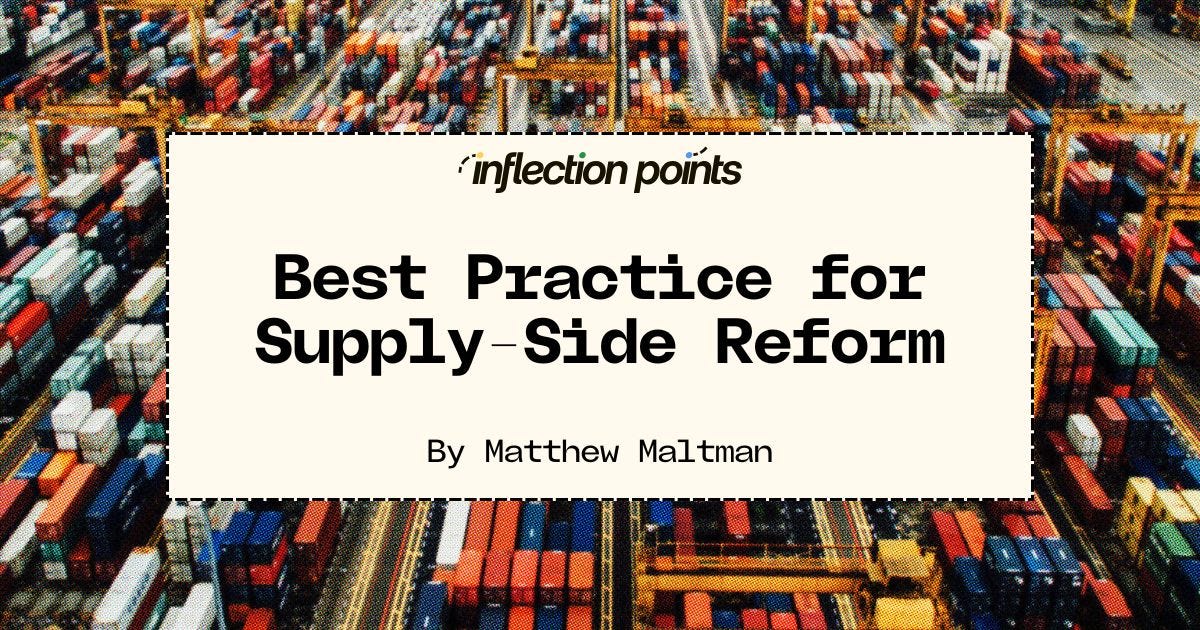Issue 03: Removing the barriers to Australian prosperity
The third edition of Inflection Points focuses on how to improve supply-side reforms and democratic engagement.
Edition three of Inflection Points asks how we can remove unnecessary barriers to Australian prosperity. From rules that decide what we can build to the incentives shaping our politics, our economy is littered with small constraints that add up to large barriers. Each of this edition’s essays tackles a different choke point and together sketch a broad vision about making Australia move faster. The four feature essays are:
A Higher Standard for Standards by Flavio Menezes
Planning is the Bottleneck to New Housing by Brendan Coates
Best Practice for Supply-side Reform by Matthew Maltman
Rebuilding Australian Political Parties by Travis Jordan
Flavio’s analysis was also written up in this morning’s Sydney Morning Herald, which highlighted his most striking findings. You can read the SMH article here (n.b., paywalled article).
Canberra readers: on November 25, we are coming to your city.
RSVP for our Canberra launch here.
A Higher Standard for Standards
Standards are the invisible architecture of technological progress. But, in Australia, that architecture is paywalled and crumbling. In a system where even regulated standards cost hundreds of dollars to access, the rules that govern innovation have themselves become barriers to it.
Flavio Menezes argues that the current model—where mandatory Australian standards are controlled by a private monopoly and fragmented across jurisdictions—adds cost, delay, and uncertainty to the very sectors driving the net-zero transition. His analysis for the Treasury shows that duplication and slow updates to standards are delaying investment in critical areas like batteries, EV charging, and recycling. To modernise this invisible infrastructure, Flavio proposes three shifts:
Make regulatory standards freely available to everyone who must follow them.
Base standards on rigorous analysis and consistent national applications.
Default to international standards, rather than bespoke Australian ones.
He argues that better standards are good productivity policy. Freely accessible, performance-based, and globally aligned standards would cut red tape, lower costs, and accelerate the clean energy transition.
Flavio Menezes is a Professor of Economics at the University of Queensland.
Planning is the Bottleneck to New Housing
Australia’s housing shortfall is a planning problem first. Brendan Coates shows how sclerotic land-use systems have made well-located homes artificially scarce, pushing prices and rents to historic highs, hollowing out inner-city opportunities for the young, and sapping productivity via longer commutes and weaker job matching.
Brendan’s essay shows that planning says “no” by default (bans on density across most inner and middle suburbs), approvals are slow and uncertain, and consultation is biased toward incumbents. The result is fewer homes where demand is strongest, with one of the steepest declines in housing per adult in the OECD. To solve this, Brendan proposes four main shifts.
Relax the rules where demand is highest, with by-right townhouses up to three storeys across all residential land and at least six storeys within walking distance of transit.
Make approvals predictable, with by-right pathways for modest density and a deemed-to-comply track for larger projects.
Fix governance and accountability, by requiring regulatory impact assessments for planning rules and enforceable housing targets for local councils.
Align the Federation, by shifting commonwealth incentives from long-term output targets to immediate performance bonuses for verifiable reforms.
Allowing far more well-located homes could lift construction by 67,000 dwellings a year over the next decade, leaving prices and rents up to 7% lower in five years and 12% lower in ten.
Brendan is the Housing & Economic Security Program Director at Grattan Institute.
Best Practice for Supply-Side Reform
Supply has a PR problem. When asked to think about the economy, most of us think of the demand-side. But the most powerful levers for change are often on the supply-side. Mattew Maltman shows why fixing that matters, especially if Australia is to return to the successes of the 1990s.
Drawing on New Zealand’s zoning reforms, Matthew argues that the most powerful microeconomic changes don’t speed up paperwork; they remove the rules that stop things from happening in the first place. Upzoning in Auckland and Lower Hutt unlocked firm entry, lifted construction productivity, and delivered a quiet affordability dividend as rents decoupled from national trends.
Matthew outlines three principles for reform:
Target bans, not burdens. Cutting fees and shortening processes moves inches; legalising activity (e.g., medium-density housing) moves the field.
Think markets, not firms. Good reform enables entry and competition, and benefits often accrue to firms that don’t yet exist (so can’t contribute to consultations).
Control inputs, monitor outputs. Set durable upstream rules and let cycles play out; small, compounding gains raise the floor over time.
Matthew is a Research Economist at e61 Institute.
Rebuilding Australian Political Parties
Travis Jordan argues that Australia’s next democratic flourishing depends on rebuilding participation through political parties, not bypassing them. Despite world-class institutions, trust is falling as membership has collapsed and parties have drifted into cartel-like, insider control.
But structural incentives keep parties closed and citizens passive. Parties enjoy public privileges with minimal transparency, while alternatives like deliberative forums or campaign outfits can’t replace representative institutions or create durable pathways for busy people to become active members. The result is a widening gap between citizens and the organisations that convert values into policy.
To close that gap, Jordan proposes linking public money to public benefit: a $60-per-voter voucher (replacing existing party funding) redeemable only with organisations that meet baseline governance standards and grant full voting rights to voucher members, reinforced by nudges to attend events, vote in internal elections, and contribute to policy. Treating parties like regulated utilities—open, transparent, and accountable—would lower barriers to entry, boost membership, and restore confidence by turning passive observers back into active citizens.
Travis is a campaigns consultant, lawyer and long-time political staffer.
Support Inflection Points
Since we’ve launched, many people have reached out to us asking: how can we help make Inflection Points a success? We held back from answering too quickly, because we wanted to be clear about the kinds of involvement that would strengthen, rather than complicate, our lean model. With that in mind, you can read more about how to support Inflection Points here.
Reform begins with ideas; and we hope you’ll help us share them. If you think someone you know would enjoy Inflection Points, please forward this email or direct them to our website.
– The Inflection Points Team






